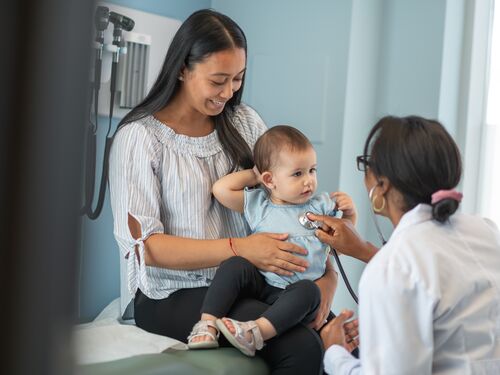When Talking to Parents About COVID-19 Vaccines for Children, Emphasize Safety, Encourage Speaking with Family Doctor, and Leverage Social Connections, Says New Expert Consultation
News Release
By Megan Lowry
Last update October 13, 2021
WASHINGTON — When communicating with parents about getting their children vaccinated against COVID-19, emphasize the safety and efficacy of the vaccines, encourage them to talk with their child’s pediatrician or family doctor, and leverage parents’ social networks, says a new rapid expert consultation from the National Academies of Sciences, Engineering, and Medicine.
Although COVID-19 vaccines have not yet been authorized for children under 12 years of age, once they are, vaccinating children will likely play a critical role in limiting the spread of COVID-19, the consultation says.
Key factors in parents’ vaccine decisions include concerns about side effects of the vaccine, how well the vaccine works in children, availability of research in the child’s age group, the recommendation of their child’s health care provider, and parents’ own research. Based on these factors, the consultation highlights strategies for communicating with parents about the COVID-19 vaccines:
Emphasize Safety and Efficacy — Informing parents about the ongoing scientific efforts to answer more questions about the vaccine and highlighting ongoing vaccine risk monitoring efforts could help address some parents’ anxieties. Messaging can also point to safety data from the clinical trials for 12- to 17-year-olds, and the lack of serious adverse events from the vaccine in this age group. The consultation says safety concerns may be heightened among parents of young children — and engaging them now could be critical, focusing conversations on the rigor of clinical trials and the regulatory process.
Encourage Parents to Talk with Primary Care Provider — Research shows that family doctors and other health care providers are trusted messengers and are often crucial conduits of vaccine information for parents. Local, state, and national leaders can provide messaging templates and other resources to health care professionals engaged in these conversations. The consultation points to the Kansas Department of Health and Environment as an example, which developed a manual for doctors on creating and sending mass emails and text messages to patients encouraging them to get vaccinated against COVID-19.
Leverage Parents’ Social Networks — It is important to engage parents’ social networks, especially members of their community who are considered trustworthy and influential. These social networks may include family members, friends, co-workers, social media networks, media, and church members.
While the consultation says that different groups of parents will require different messaging, communication can start by focusing on what child vaccinations can accomplish: preventing COVID-19, and allowing children to attend school in person and participate in extracurricular activities without risking their health.
Communicating in the Current Pandemic Context
The consultation also offers new strategies for communicating with parents and other people who have not yet received a COVID-19 vaccine, in addition to strategies offered in previous National Academies consultations. While it is critical to not derogate unvaccinated people’s past choices, communicators can point to new events or information about the vaccine — such as the emergence of the delta variant or full FDA approval of the Pfizer vaccine — to give them the opportunity to make a new decision.
Presenting people with data about positive vaccination trends — such as how previously hesitant individuals are increasing their vaccination rates, or increased acceptance of the vaccine in their communities — can also be useful, says the rapid expert consultation.
Undertaken by the Societal Experts Action Network, Communication Strategies for Building Confidence in COVID-19 Vaccines: Addressing Variants and Childhood Vaccinations was sponsored by the National Science Foundation and the Alfred P. Sloan Foundation.
The National Academies are a private, nonprofit institutions that provide independent, objective analysis and advice to the nation to solve complex problems and inform public policy decisions related to science, technology, and medicine. They operate under an 1863 congressional charter to the National Academy of Sciences, signed by President Lincoln.
Contact:
Megan Lowry, Media Officer
Office of News and Public Information
202-334-2138; e-mail mlowry@nas.edu
Related Resources
Featured Publication
Communication Strategies for Building Confidence in COVID-19 Vaccines: Addressing Variants and Childhood Vaccinations
Rapid Expert Consultation
·2021
The fourth wave of the COVID-19 pandemic in the United States has been fueled by the delta variant, which is more contagious than earlier variants, and a slowing down in new vaccinations. Most hospitalizations and deaths in the United States are occurring among people who are not vaccinated. This co...
View details
More like this
Discover
Events
Right Now & Next Up
Stay in the loop with can’t-miss sessions, live events, and activities happening over the next two days.
NAS Building Guided Tours Available!
Participate in a one-hour guided tour of the historic National Academy of Sciences building, highlighting its distinctive architecture, renowned artwork, and the intersection of art, science, and culture.

